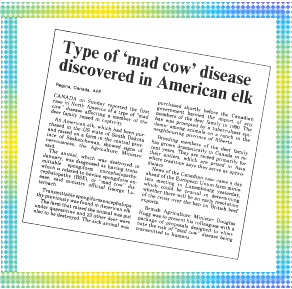| |
|
Type of‘mad cow’disease discovered in American elk
CANADA on Sunday reported the first case in North America of a type of "mad cow" disease affecting a member of the deer family raised in captivity. An American elk, which had been purchased in the US state of South Dakota and raised on a farm in the central province of Saskatchewan, showed signs of nervousness, the Agriculture Ministry said. The animal, which was destroyed in January, was diagnosed as having transmittable spongiform encephalopathy, which is related to bovine spongiform encephalopathy (BSE), or "mad cow" disease, said ministry official George Luterbach. Transmittable spongiform encephalopathy previously was found in American elk. The farm that raised the animal was put under quarantine and 23 other deer were also to be destroyed. The sick animal was purchased shortly before the Canadian government banned the import of any members of the deer family in 1990. The ban was prompted by a tuberculosis epidemic among animals on a ranch in the neighbouring province of Alberta. Breeding members of the deer family has grown dramatically in Canada in recent years. They are raised primarily for their antlers, which are prized in Asia where tradition says they serve as aphrodisiacs. News of the Canadian case came a day ahead of the European Union farm ministers meeting in Luxembourg yesterday, which could be crucial in determining whether there will be an early resolution of the crisis over the ban on British beef exports. British Agriculture Minister Douglas Hogg was to present his colleagues with a package of proposals designed to eliminate the risk of "mad cow" disease being transmitted to humans.
|
|---|
 Bangkok
Post ◆ April 30, 1996
Bangkok
Post ◆ April 30, 1996